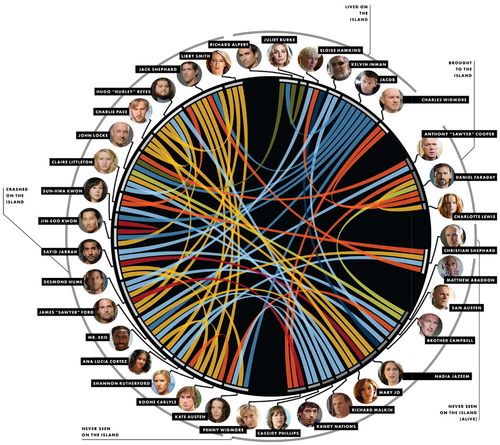So you can maybe enjoy the last few episodes, if you haven't seen Lost.
And if you're not confused enough… (click to embiggen)
And Wired has lots of other fun stuff for Lost fans…. including this interview. it appears that we're not going to get all the answers….
Cuse [producer]: But there’s still going to be plenty of room for debate when the show is over. We are going to take a stab at providing a conclusion, and one that we hope will be satisfying on a character level. The bigger questions, we recognize, are not answerable. We feel that demystifying some of the things we do on Lost is like the magician showing you how the trick is done, and we don’t want to do that.
Carroll [interviewer/physicist]: Is there a worry that there exists questions for which any possible answer is not as interesting as the question would be before you knew the answer?
Lindelof [producer]: Absolutely. I assume that as a physicist, you say, “Force equals mass times acceleration,” and you can explain why. But when you spend time with a 3-year-old, you quickly find out that one question just begets another—there’s a “why” in the wake of every “why”—and the only way to end the conversation is to say, “Oh look, a Chuck E. Cheese!” The show is doing its best to say, “Oh look, Chuck E. Cheese!” For example, we’ve now given the viewers as much as we’re willing to say about the numbers, and we’re moving on. The characters are going to ask “What is the island”, and “Why are we here”, but more importantly, “How is it relevant to me.” They’re not sitting around in smoking jackets talking about the theoretical notions that we are, as audience members.
Cuse: I think there’s this essential human desire to have a unified field theory. Everyone is like, “I want to unlock the single secret to Lost.” There isn’t any one secret. There is not a unified field theory for Lost, nor do we think there should be, because philosophically we don’t buy into that as a conceit.
Lindelof: As much confidence as we have in the story we’re telling, we are also comfortable saying, “But what do we know?” This is our best version of the story of Lost, and it’s the definitive one. The worst thing we could ever do is not end it, or go with some bullshitty ending like a snowglobe or a cut to black. That was genius on The Sopranos, but The Sopranos isn’t a mystery show. For us, we owe our best version of a resolution here.
Cuse: These heady questions are ultimately unanswerable, and we know the audience is hoping that those things are going to be answered. The great mysteries of life fundamentally can’t be addressed. We just have to tell a good story and let the chips fall where they may. We don’t know whether the resolution between the two timelines is going to make people say, “Oh, that’s cool” or “Oh, fuck those guys, they belly-flopped at the end.” But the fact that we’re nervous about it and that we’re actually attempting it—that is what we had to do. We had to try to make the dive.


